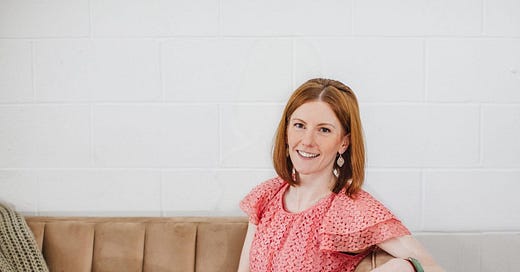Bottled Emotions: The Illusion of Alcohol as an Escape
From “brain on a stick” to learning how to feel
Six years ago, I was reading everything I could about giving up alcohol. I devoured personal stories, peer-reviewed research articles, and popular self-help books. I had spent my life honing my mind—a skill society rewards. Reading and knowledge became my sanctuary.
But what was I doing, really?
I was exploring my curiosity about sobriety and trying to cope with my fear of giving up alcohol. Maybe that’s why you’re reading this now.
I quickly realized that, as a high achiever, I was a “brain on a stick.” My academic training made me overthink. I used alcohol in an attempt to outrun the negative emotions that overthinking caused. Drinking provided a temporary escape.
Indeed, studies show that people with higher IQs often drink more.1 They may do this to cope with stress. This was certainly true in my case. I didn’t have any training on what to do with uncomfortable emotions, and I believed I didn’t have time to figure that out. It didn’t even seem important. Just drink to relax and keep going.
I didn’t have one specific moment when I decided to quit, but I experimented with not drinking at an open-bar wedding in 2018. I had such a good time that night that family and friends didn’t believe I wasn’t drinking. I saw the possibilities of a life without alcohol.
At that point, I was 32 years old. Hangovers and the physical consequences on my gastro-intestinal system were adding up in way I didn’t experience in my twenties.
Even on the last day I drank (New Year’s Eve 2018, in New York City’s Times Square), I wasn’t sure it would be my last time. I was pretty convinced I was done, but I didn’t know I’d be here almost six years later—still without alcohol.
I was ready to face the next layer: feeling uncomfortable emotions.
Those early days weren’t that difficult. I started to feel better physically almost immediately. My body was thanking me for not drinking, and that was a big boost in personal motivation.
The hardest part was losing friends and family through the process. Without my usual way to relax, I wasn’t that pleasant to be around at home. I had to learn new ways to relax and soften. Some people were patient with that process; others were not.
Through this journey, I began to feel my emotions more deeply. I realized that the very feelings I was running from weren’t that difficult to face with tools and support. It wasn’t a glamorous process, feeling emotions (still isn’t), and it didn’t happen at all once.
But when I removed alcohol, I had the ability to process more and face myself more. Like many sober people, I found other ways to distract myself. I’m still working through layers of distraction! But it’s way easier without alcohol. I feel so much more alive without it.
Part of me wishes I could tell you my life has been wonderful since I stopped drinking alcohol. But look: life still happens. It’s not all rainbows and sunshine. Four months after my husband and I decided to divorce in early 2022, he died unexpectedly. And that’s just one of the major life events I’ve experienced since giving up alcohol. But the key thing is this:
I would have thought that a major life loss would send me back to drinking alcohol, but it didn’t. At that point, I didn’t want alcohol. It didn’t arise as an issue or a way to cope.
The times when I crave alcohol are strange in the bigger picture and feel random. The last time I wanted a drink was in 2023, when I felt deep angst after leaving a grocery store.
But those moments pass. And here I am six years later, writing this now.
A Message From Me to You
So can you give up alcohol? Absolutely. What will you face when you do? Quite possibly, a deep well of unprocessed emotions and physical tension. But I believe it’s worth it. Feeling alive and feeling the full range of emotions is way better than numbness.
I’ve coached many people on their journey to stop drinking. I tell you that not to sell you on me as a coach, but to share what I’ve seen. Sometimes it helps to find compassion from another person—particularly when we have trouble finding it for ourselves.
Just know that we can learn to be kind to ourselves, without judgment. We can learn to feel emotions in safe spaces. We can learn to slow down and gain awareness of our very human patterns.
There are so many tools and ways to lean into this emotional work. Start with what appeals to you.
Cheering you on wherever you are in the journey. Feel your toes and let a big, deep breath in. It’s worth it!
Your turn!
We’d love for you to share in the comments:
Did you have to relearn how to be with your feelings after getting sober?
Have you experienced major losses in sobriety? How did it go, facing them without alcohol?
And if you found this article helpful, please tap the little heart. It lets others know there’s something useful here and will help us grow this community.
Want to be published on Sober.com? If you’re a sober writer, we invite you to contribute! Reach out to hello@danaleighlyons.com for details.






Thank you so much for sharing your story, Caitin. I can really identify with being too much in my head, not enough in my feeling - and how getting sober disrupted this in profoundly healing ways. I’ve also been amazed to find that facing loss sober is more ease-ful than facing it while drinking.
Feeling my emotions was definitely the hardest part of early sobriety. Now, the idea of burying them seems ridiculous. It’s incredible how your entire worldview can change if you let it.